Human Rights Watch Film Festival London 2020: COLLECTIVE, LOVE CHILD & More
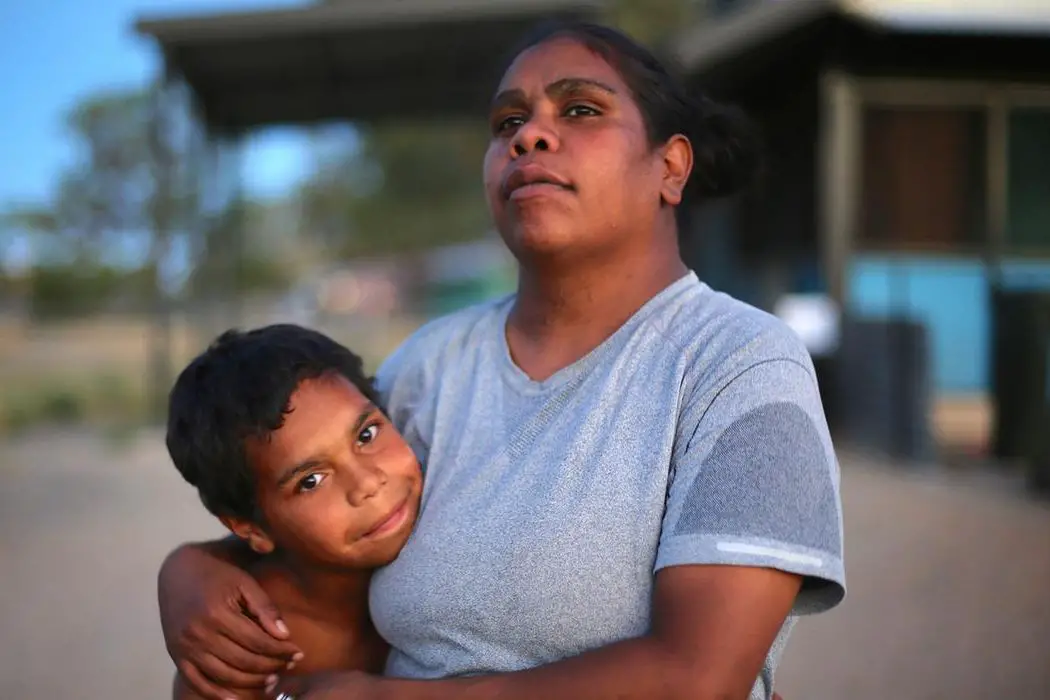
Musanna Ahmed is a freelance film critic writing for Film…
The London Human Rights Watch Film Festival will be presented from 12 to 20 March 2020, featuring empowering documentaries and dramas celebrating courageous people from 14 countries: Armenia, Australia, Bangladesh, Bolivia, China, Guatemala, Germany, Iran, Macedonia, Mexico, Peru, Romania, the United States, and Vietnam. 11 of the 14 films selected for this 24th edition are directed by women.
I had the privilege of being able to view many of the films in advance and can attest to the high quality of cinematic storytelling that will be presented this year. See below for my reviews of four robust films, beginning with opening night film Collective.
Collective (Alexander Nanau)
In Bucharest, just under five years ago, a fire broke out at the Colectiv nightclub, killing 27 people and injuring another 180. It was one of the worst disasters in contemporary Romanian history. The lack of fire exits was shocking enough but a subsequent 37 deaths amongst the many injured triggered an investigation into a corrupted health system. Protests forced the government to resign and a group of journalists from the Sports Gazette began their probe into the local hospitals, discovering horrifying activity.
Catalin Tolontan is a leading journalist for the Gazette, the closest we have to a lead character in this multifaceted, brilliantly observed documentary. He has a tenacity, a simmering rage, a fierce conscience to let the public know the truth. He’s the sort of character Mark Ruffalo (Spotlight, Dark Waters) would play if this story was adapted into a feature. He very quickly discovers that the hospitals are using infected scalpels that only have 1.17% of active ingredient when they should have 12%, thereby giving birth to the most dangerous hospital bacteria.
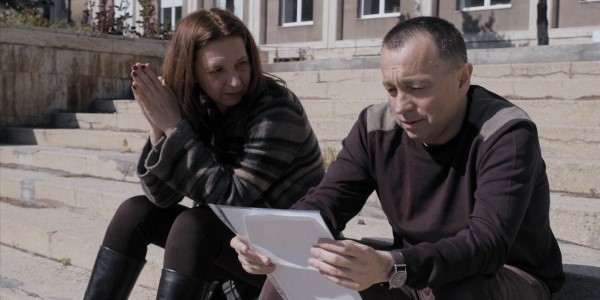
“Disinfectant diluted ten times!”, reads the Gazette’s headline, one of the only outlets the country can get behind with activists favourably chanting Tolontan’s name during protests. The mainstream media soon picks up the story, describing the revelation as ‘biological bomb’. This prompts a response from the Minister of Health, a position assumed through a revolving door. In one of the rare instances where the camera is acknowledged, Catalin speaks of the desynchronised relationship between the Gazette and the government by telling the filmmakers, “When the press bows down to the authorities, the authorities will mistreat the citizens.”
In an interesting twist – and a testament to Nanau’s trusted ability to tell this story the right way – the new Minister of Health, Vlad Voiculescu, gives access to the filmmaking crew, letting the audience in on his meetings. We see him urging his team of advisors to take responsibility and be proactive about finding solutions rather than to dismiss the ordeal with whataboutery per his predecessor. The resistance he gets, from both a pessimistic public and an unscrupulous government, adds to the complexity and speaks to his choice to be transparent for this film.
Parallel to the journalist and the politician is the story of a scarred survivor, Tedy, an artist who poignantly expresses her physical aftermath in a photo exhibition. She meets Mr Voiculescu, who tells her the honest truth about the woefully under-equipped local hospitals and their lack of support for patients seeking help elsewhere – “It was a political decision to not pay for your treatment abroad.” Collective morphs into a story that goes beyond the aftermath of the Colectiv fire to cover Bucharest’s entire hospital system at large, including the deficiency in covering lung transplants and the harmful politicisation of hospital managers.
There’s something inherently uncinematic about films about journalists (that aren’t Nightcrawler) with much of their time spent behind desks looking at screens, writing walls of texts. Nanau, on the other hand, has a sharp eye in identifying emotion and information with each shot in the newsroom. TV’s are often viewed within the frame, displaying the news cycle and capturing the responses from politicians and the media in real time. It’s brilliantly concise filmmaking.
Collective is a suspenseful viewing experience as gripping as Spotlight, Zodiac or any of the best investigative thrillers. A completely gripping exposé of a healthcare system in crisis that functions so effectively as a cinematic experience with its righteous protagonist, huge twists, a big bad villain, a bigger, badder villain and deeply important message. As healthcare is at the forefront of every general election, this documentary should serve as one of the most staggering cautionary tales for every country in the world.
Collective will be screened at the Barbican at 6.30pm on March 12, 2020. Click here to buy tickets.
Love Child (Eva Mulvad)
Leila and Sahand left Iran with their four year old son Mani after they both committed adultery and secretly had a child out of wedlock (there’s no mistaking Mani for Leila’s actual husband, for the kid is the spitting image of Sahand). In Iran, it’s a crime that could be punished by execution. Eva Mulvad’s heartbreakingly beautiful documentary Love Child follows the family in exile in Turkey, seeking a better permanent home, hamstrung by bureaucratic limbo.
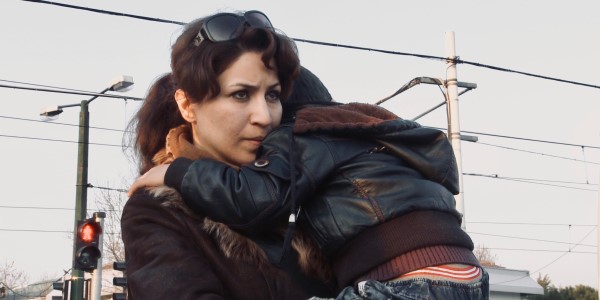
The most crucial element of the film is Mulvad’s access into therapy sessions with Leila and Sahand. It’s an observational documentary filmmaker’s dream for providing context, as we get to hear the entire life stories for both characters through their meetings. Leila speaks first, talking about her marital history to a violently abusive man. Whilst working at a university, she met Sahand and entered into an affair with him. She made her husband believe little Mani was the result of their intimacy, so as not to reveal the secret of his illegitimacy. The struggle to create a family dynamic made Leila and Sahand decide it was time to leave with the boy.
The fast-talking Sahand, on the other hand, speaks less about the life before and more about the life ahead, sharing details of his time working with Iranian intelligence officers and fearing that they’re chasing after him after his suspicious departure from the country, stating that Turkey isn’t the safest escape point. Their most affecting reflection is a guilt for getting out, discussing their families left behind who now have a burden of responsibility. We often think about the plight of the refugee, but the state of their close ones left behind is something seldom considered.
Post-Brexit immigrants to England will be faced with a concerning new points system that the Home Office estimates would’ve prevented 70% of EU workers currently in the UK from entering the UK. I thought about these requirements when watching Leila and Sahand quickly pick up the Turkish language and use their university experience to teach English to kids. If we were assessing “highly skilled individuals”, their multilingualism and significant education experience speaks for itself. But I wonder if the UK would turn them away if they struggled to get a sponsored offer or find a job at their appropriate skill level due to the legal limbo that awaits refugees.
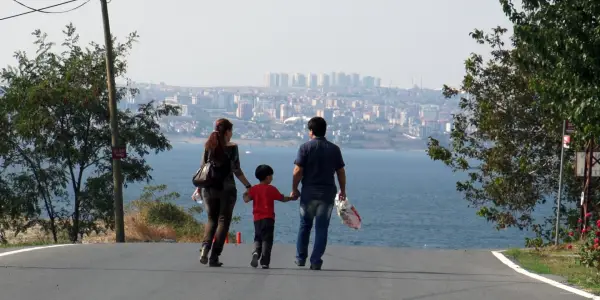
Mulvad is the fly on their wall, observing the family day-to-day trying to live by ignoring the targets on their back from both immigration officers seeking more documents and invisible Iranian surveillance. Whilst she barely makes her presence felt, with the characters only addressing the camera two or three times, the strong trust between subject and filmmaker is evident as she captures them in their rawest states of hope, fear, anger and celebration.
The somewhat lengthy viewing experience can be almost as exhausting as the process of asylum itself, with the drawn out process making for a tiring emotional ordeal for both us and them. Consequently, however, the pay-offs have a harder impact. Love Child is an inherently touching story that adds a poignant dimension to the refugee story with the theme of survivor’s guilt. Every story is unique and every one of them is vital.
Love Child will be screened at the Barbican at 6.05pm on March 17 and at Regent Street Cinema at 8.30pm on March 18, 2020. Click here to buy tickets.
In My Blood It Runs (Maya Newell)
Here’s a child who isn’t particularly mature, often letting his impulses get the better of him at school and getting in trouble for his behaviour, but with a clear-sighted outlook that’s way beyond his years. 10-year-old Aboriginal boy Dujuan introduces himself in this stirring Australian doc by saying, “I was born a little aboriginal kid. That means I had… a memory about aboriginals. I just felt something… a memory. History, in my blood it runs.” Through his collection of wandering thoughts, he has something profound to say and Maya Newell is there with a platform, sharing the journey of two Aboriginal generations seen through a mother and her son.
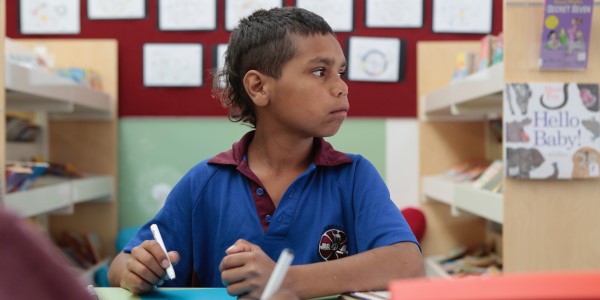
In My Blood It Runs is one of the few films I’ve seen that doesn’t filter the daily experiences of an Aboriginal Australian family through an outsider’s gaze, letting the characters dictate the narrative as it is for them. Newell’s presentation is deeply empathetic, capturing the reality of a community living under an unjust legal and educational system. Aesthetically speaking, the story is told with an assured hand, a gorgeously shot journey with actuality both wonderful and melancholic.
The camera accompanies Dujuan and his mother Megan as they go on shopping trips, trek to their homeland Sandy Bore, congregate with the locals and practise cultural customs. One of the tenets in the Arrernte people’s spirituality is to practise their healing power, so we see the family take regular trips to “the bush”, the sacred terrain that differs from the town in its harmony with the vision of their Elders. Megan’s efforts to preserve the Arrernte identity – the language and traditions – across the next generation is a campaign relatable to a lot of second-generation immigrants.
It’s especially significant when we get into the classroom and witness a squirm-inducing scene of a white teacher trying to explain spirits to a class of Aborigine kids, ignorantly hand-waving as she teaches. “White people educate our kids the way they want them to be educated”, says Megan, all the while living with a concern for Dujuan as he’s rebuked for his behaviour. The uncomfortable subtext is that the alternative for students who don’t do so well is being placed in juvenile detention centres.
These centres are presented as systems of punishment rather than rehabilitation, and there’s a line to draw between the American prison-industrial complex and a similar network for indigenous children in Australia, who are tortured through this form of cultural genocide. Newell acquires powerful archive footage of protests held across the country against the cruel treatment of children in these centres. In My Blood It Runs sensitively gives a voice to the Indigenous Australian communities whilst engaging with the socioeconomic issues that affect their livelihoods. It’s remarkable.
In My Blood It Runs will be screened at the Barbican at 4pm on March 15, 2020. Click here to buy tickets.
Made in Bangladesh (Rubaiyat Hossain)
I’m in awe of this Bangladeshi social realist drama, an immersive experience into the world of a textile factory worker fighting for worker’s rights, born out of the filmmaker’s own history as a woman’s rights activist. Rubaiyat Hossain‘s third feature film is striking in both theme and technique.
We follow the life of Shimu (Rikita Nandini Shimu), a 23-year-old woman who works dusk till dawn in a clothing factory in Dhaka. She just about gets time to pray and relax at home with her unemployed husband Sohel (Mostafa Monwar). A crisis occurs when the employees have to work overtime after the factory catches fire and kills a co-worker, and it’s during her commute to work the next day where she’s stopped in the street outside her factory by someone who believes Shimu and her colleagues can be assisted in times like this.
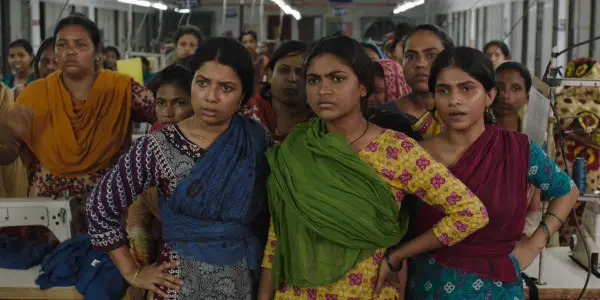
This is Nasima (Shahana Goswami, the most recognisable face in the cast), a union advocate who invites Shimu to a meeting where factory workers can learn about workplace laws and the rights they’re entitled to. There’s nothing in Shimu’s response to suggest she buys into Nasima’s deal but a tumultuous meeting with the factory boss convinces her to go forth and learn about unionising in spite of her skeptical colleagues, including one who sighs, “There are no laws protecting poor people.”
This heroine’s journey features a lot of routine moments, from walking the same route to and from the factory, to praying each day, to doing the humdrum administrative tasks when starting a union. Each time, though, there are meaningful differences in both Shimu’s behaviour and the response from others – actions and reactions accumulated through deep character and narrative development.
Not all of the changes made are progressive – Shimu only starts donning a hijab to work only because her husband requests her to after he fears she’s interested in other men. Then the number of colleagues who stick by her side dwindles as the patriarchy exerts its power. “We’re women. We’re screwed if we are married, we’re screwed if we aren’t,” Shimu surmises to Nasima when the adversity from colleagues, her husband and the factory workers becomes overwhelming.
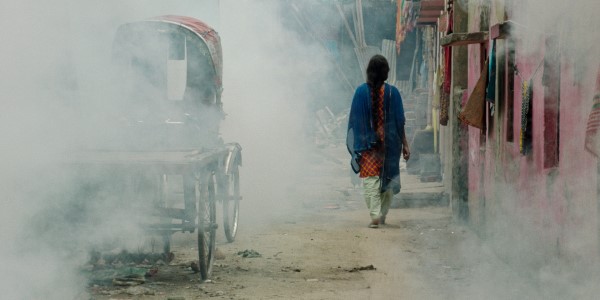
Made in Bangladesh is a formal marvel. The sparse use of classical music gives way to the industrial bustle that rings down the streets of Dhaka. The slow zoom is used to great effect, letting objects and emotions in the rest of the frame get swallowed up in uneasy moments, most significantly in the fire sequence when we focus on the alarm going off and in a third act twist when the camera swoops into Shimu’s face as she faces a major set back.
Many of the actors here are receiving their first credit here and all have a knack for performance, turning in a top-tier ensemble act. Rikita Nandini Shimu is particularly a revelation, comfortably leading the way with a role that’s heavy on both big emotions and subtlety, mastering the simmering disposition of her character.
The strong neorealist aesthetic puts us right into Shimu’s world, enabling us to empathise with the isolation felt by helpless textile workers in the Third World, economically exploited by foreign retail empires. This is a perfect inclusion in the Human Rights Watch Film Festival for its power to inspire us to take action and help improve working conditions in the global garment industry by supporting women like Shimu.
Made in Bangladesh will be screened at the Barbican at 6.30pm on 20 March, 2020. Click here to buy tickets.
That ends the first part of my coverage of this year’s edition of the Human Rights Watch Film Festival London, stay tuned for more reviews including the Velvet Revolution doc I Am Not Alone and David vs Goliath story Maxima. Click here to view the full programme and purchase tickets.
https://www.youtube.com/watch?v=FGfpamcAHo4
Does content like this matter to you?
Become a Member and support film journalism. Unlock access to all of Film Inquiry`s great articles. Join a community of like-minded readers who are passionate about cinema - get access to our private members Network, give back to independent filmmakers, and more.
Musanna Ahmed is a freelance film critic writing for Film Inquiry, The Movie Waffler and The Upcoming. His taste in film knows no boundaries.













